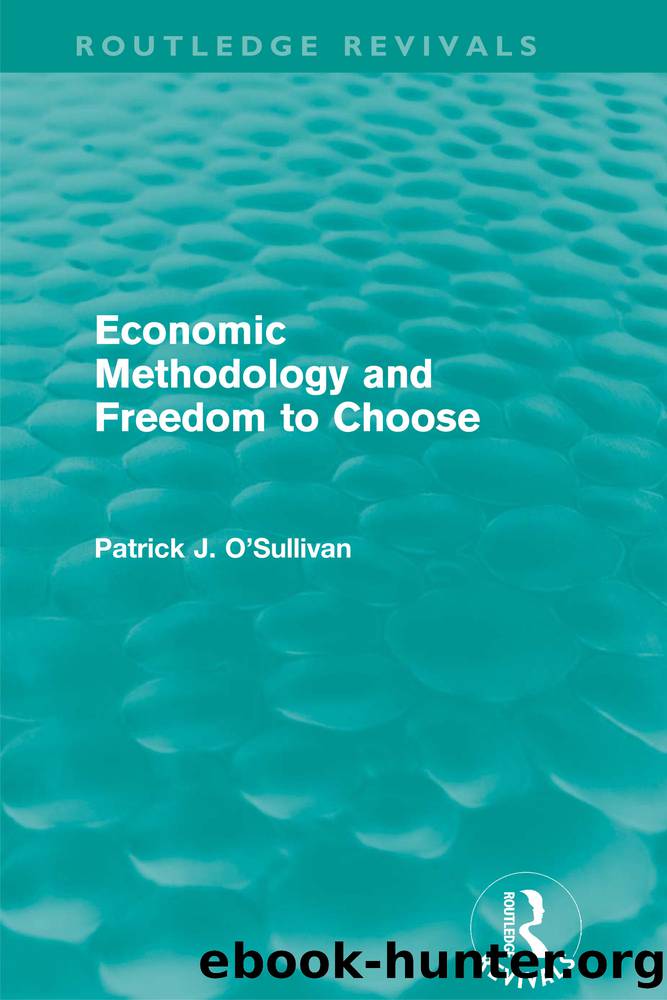Economic Methodology and Freedom to Choose (Routledge Revivals) by O'Sullivan Patrick;

Author:O'Sullivan, Patrick; [O'Sullivan, Patrick J.]
Language: eng
Format: epub
Publisher: Taylor & Francis Group
Published: 2022-08-15T00:00:00+00:00
9.3 John Neville Keynes
No survey of economic methodology in the last century would be complete without a reference to John Neville Keynesâ work The Scope and Method of Political Economyâ.17 Since this was a book devoted entirely to questions of methodology and the underlying philosophical issues which they raise, Keynes could hardly be guilty of superficiality. Nevertheless, throughout the whole of the book Keynes never once raises the fundamental question of whether or not the human sciences should adopt a subjectivist â interpretive methodology which with its teleological mode of explanation is radically distinct from the methods of the natural sciences. In fact Keynes touches only briefly on the whole question of methodological differentiation (in his discussion of the âhistorical schoolâ) and the whole work is pervaded by the presumption that there should be a strict unity of method among the sciences and in particular that the human sciences should follow the efficient causal modes of explanation of the natural sciences.
Since at no point does Keynes give a systematic statement of the reasons for adopting a methodological monism, his views on the topic must be inferred from various remarks and presuppositions that occur at other stages of the work. There are two places were Keynesâ implicit sympathy with methodological monism become fairly evident: first, in his discussion of the âhistorical schoolâ of economists and, secondly, in his discussion of induction and deduction in the human sciences.18 We shall now consider each of these parts of Keynesâ work in turn.
The Historical School of economics was an offshoot of the wider romantically inspired hermeneutical approach to the human sciences which was prevalent in Germany in the nineteenth century. Arising from Dilthey's humanism, there were two fundamental tenets in the historical school's methodology.
First, since the starting point of this approach is a forthright assertion of human subjectivity â that man is a free and self-conscious being, the responsible author of his own actions â it follows that to understand a human action we must understand the goal or intention of the agent involved. In other words the hermeneutical movement gives an early expression to the imperative of a subjectivist â interpretive methodology of the human sciences and insists, moreover, on the radical differentiation of this approach from the methodology of the natural sciences. (This was a direct reaction to Comte's reductionist objectivism in the human sciences.)
Secondly, since each human action is freely chosen it is, strictly speaking, unique and partakes of the character of a work of art. Hence any attempt at generalization regarding human activity is found to be distortive and each human action is to be interpreted and understood singly. Human science becomes hermeneutics â the art of interpreting individual actions in their historical setting â and resembles history or literary criticism much more than the natural sciences.
What is most interesting from my point of view in Keynesâ discussion of the Historical School is that his criticisms are directed entirely at the second tenet while he completely ignores the first. Thus
Download
This site does not store any files on its server. We only index and link to content provided by other sites. Please contact the content providers to delete copyright contents if any and email us, we'll remove relevant links or contents immediately.
Incentives and Prosocial Behavior by Incentives & Prosocial Behavior(372)
Reframing Difference in Organizational Communication Studies: Research, Pedagogy, and Practice by Dennis K. Mumby (editor)(322)
Financial Markets, Public Policy, and the East Asian Miracle by Financial Markets Public Policy & the East Asian Miracle(278)
The 21 Irrefutable Truths of Trading: A Trader's Guide to Developing a Mind to Win by John Hayden(244)
Handbook of Intercultural Communication and Cooperation (9783666403279) by Unknown(239)
Human Security in Turkey by Alpaslan Özerdem Füsun Özerdem(234)
Human-Computer Interaction by unknow(223)
Fandom Analytics by Michael Lewis(217)
How the World Became Rich: The Historical Origins of Economic Growth by Mark Koyama & Jared Rubin(215)
Guns of the World by Unknown(213)
Inheritance and Wealth Inequality in Britain by Harbury Colin;Hitchins David;(212)
Food Security, Affordable Housing, and Poverty by Ahmet Suayb Gundogdu(202)
Asset Integrity Management Systems a Complete Guide - 2020 Edition (9780655989844) by Blokdyk Gerardus(195)
Creative problem solving for managers by Developing Skills for Decision Making & Innovation(189)
The Way of the Wall Street Warrior by Dave Liu & Adam Snyder(186)
Beyond Positivism, Behaviorism, and Neoinstitutionalism in Economics by Deirdre Nansen McCloskey(186)
The Delusions of Economics by Gilbert Rist;(178)
Diminishing Returns by Mark Blyth(172)
The Inclusion Toolbox by Jennifer A. Kurth & Megan Gross(170)
